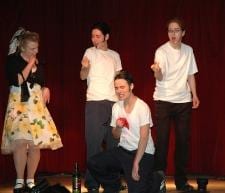The Dukes of Drag, says member Mitch Mitcham, are “not just about cocks and humping.” Montreal’s drag king collective, officially formed in 2007 by Nat King Pole and Gary Dickinson, does a surprising amount of volunteer work for the queer community.
In addition to marching in two gay pride parades and setting up a booth at Community Day in Montreal, the collective has performed fundraisers for Trans Pride, Out Productions, Head & Hands, and Sappho magazine.
Perhaps the most interesting of their community initiatives was the workshop the Dukes ran for Project 10, the organization for queer, trans and questioning youth. The Dukes spoke to the group about theories of gender and gave them tips about how to experiment with facial hair and packing.
“We really support people exploring their gender, doing their own thing with it, whether it’s drag kinging or genderfucking or transitioning, all that stuff,” says Rod Screwheart. “We just want to educate.”
To that end, their website shares tips on how to become a drag king. “You’re interested in gender diversity for yourself?” asks Johnny Cox. “Well, why don’t you put a little bit of mascara on your ‘stache?”
It’s this cooperative, do-it-yourself spirit in which the collective formed. In the fall of 2006, after performing in a drag king contest at Meow Mix, Gary Dickinson networked with fellow contest participant Dirk Van Dyk to create an email list for experienced and aspiring drag kings in Montreal. The response was overwhelming.
“Dress up was always something I loved,” says Cox, explaining his attraction to the group. “I went through different phases from five-year-old tomboy to 20-year-old trying to be a woman. And being Johnny feels less like dragging than being my 20-year-old self. For me, it was a way to get in touch with the masculine side of myself and accept it.”
Responding to the critique that the “masculine side” that drag kings portray often represents the worst qualities of stereotypical manhood, Screwheart says, “For me, a lot of dragging is about being convincing. A friend of mine put it so well: ‘The fact that biological women can dress as men and reproduce stereotypical characteristics of men and pass that way and really represent, that’s radical.’ That’s one thing that really strikes me. If I can pass by acting in this really stereotypical, macho way, that’s amazing.”
“We’re not just gender performance artists,” Mitcham says. “We’ve had a native switch dancer. We have people of different sexualities, obviously, and different genders, different sizes, different nationalities and backgrounds. Some of our members are trans and they’re exploring dual or tri or however many multi-sexualities all in one. I think it’s important to say that we make a conscious effort to be inclusive and to challenge the audience about what would be in a drag king show.”
Apparently, their audience is up for that challenge. The Dukes get a huge turnout at their shows and have even coined a name for their fans: King Blings. Ironically, Mitcham began hanging out with the Dukes as a King Bling. “My original connection was definitely to try and get busy with some of the drag kings!” admits Mitcham.
In addition to King Blings, who are usually female, Mitcham says, “We’ve gotten great feedback from dudes. One guy said to us, ‘I didn’t think I could get turned on watching a bunch of drag kings, but that was hot.'”
Although the Dukes have travelled all over Quebec and look forward to expanding their horizons further, their hearts are in Montreal.
“Montreal audiences are very intellectual, artistic and accepting,” says Mitcham. “They’re willing to see something that’s a bit more risque, more alternative, more queer.”
A grinning Screwheart adds, “They throw more panties in Montreal, too.”

 Why you can trust Xtra
Why you can trust Xtra


